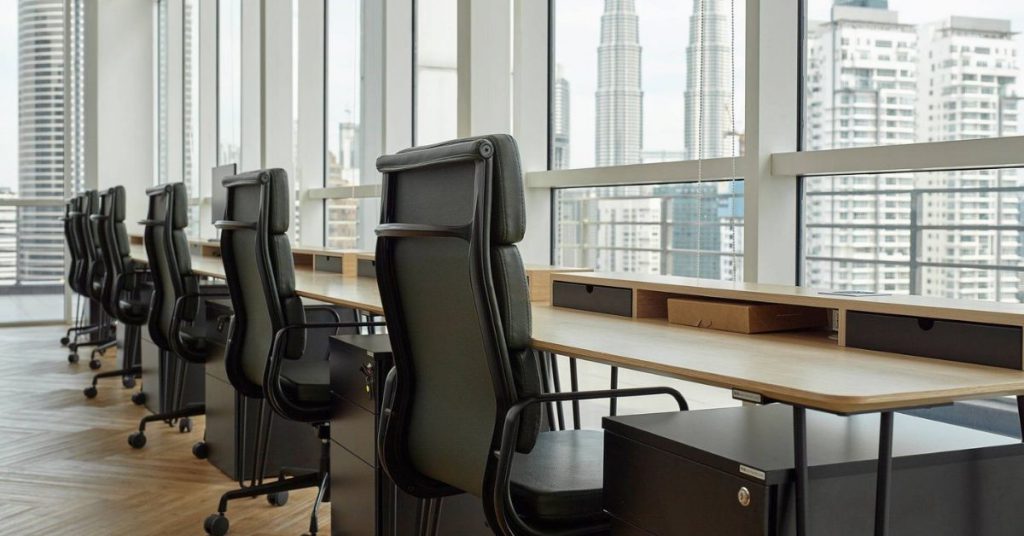Coworking spaces are increasingly becoming offices of choice for freelancers, small startups and SMEs.
Now even larger companies are getting in on the trend, trying out something different from the traditional office space for once.
We spoke to several of them regarding their move into a coworking space of choice, and here are their thoughts.
Space and cost-efficiency
One of Malaysia’s biggest biogas developers, Cenergi have been using Common Ground Ara Damansara as their main office since October 2018.
“After a thorough comparison of costs between a traditional office space and a coworking one at the end of our previous office tenancy, we found more appeal in the latter as it provided the convenience of moving into a fully-furnished space,” said Azana Fariza, Head of Corporate Affairs.
Southeast Asia’s largest used car trading platform, Carsome who rent at Colony Mutiara Damansara shared the same thoughts.

“The convenience of a move-in condition with everything being taken care of by Colony played a huge deciding factor on why we chose them,” CEO Eric Cheng said.
Furthermore, a coworking space presented to them an instantly-upgradable space for expansion needs to accommodate their rapid company growth.
K Fry, a homegrown urban Korean food restaurant chain, have been occupying 2 suites at Colony @ KL Eco City since October 2018, and they’re doing so to reduce the effort and costs that go into upkeeping a traditional office space.
In June 2019, Paramount Property, an established property developer, moved into Co-labs Shah Alam for the same reasons.
According to them, their Co-labs membership also gives them access to all other Co-labs venues across the Klang Valley, making it convenient for meetings.

“All these would require quite a hefty investment for a single organisation but is affordable when shared,” said CEO Beh Chun Chong.
PETRONAS Dagangan Berhad (PDB), a subsidiary of PETRONAS, have been renting at Common Ground since August 2018 and have since been able to minimise their spending on meeting room rentals.
The importance of location
Teleport, AirAsia’s rebranded cargo and logistics platform, have been utilising coworking space Common Ground in Damansara Heights since late 2018.
For them, renting the space makes it easier to attract talent to join them as their headquarters in RedQ is a bit of a drive since it’s near the airport, and may turn off candidates from applying.
Having a satellite office somewhere central helps them overcome this issue, and they said it could serve as a place for 3rd party meetings, too.
Cenergi cited Common Ground’s proximity to the LRT station as another reason why they chose it, since they’re trying to reduce the team’s carbon footprint.
For K Fry, their office at Colony is an easily accessible location for their employees.
Opportunities for team-building and networking
To Paramount Property, the open-concept workspace at Co-labs allows for more interaction amongst staff.

Cenergi found the alternatives to working at solitary desks available at the coworking spaces useful in bringing teams together through working in more open and relaxed settings.
Community activities organised by the coworking spaces helped K Fry’s staff meet people from other industries and enhance their social networking skills.
The mix of tenants available was also what initially attracted Teleport to station its employees in a coworking space, and they found the talks and events held there good for networking, too.
For Common Ground tenants, an app is available for further networking, and Teleport have found it useful in creating connections for idea exchanges and exposure to new startups.

PDB see the mix of startups and giant corporations in the coworking space as a win-win situation as they can learn from each other.
Giant corporations can learn to deliver more meaningful innovations to customers from startups while the latter can leverage on the stronger infrastructures of the former to scale up, PDB said.
As the first tenants in their respective coworking spaces, Carsome and Paramount Property said that they haven’t been able to collaborate with other companies yet but that there’s potential to do so.
Changes in work culture and productivity
Carsome found that coworking spaces took the hassle away from administration-related matters so that everyone could focus on growing the company.

Cenergi noticed positive changes in communication across teams with the flexible seating arrangements allowing for movement as needed during stages of project development.
They said that this signals to their management that teamwork is now occurring both frequently and naturally.
Teleport reported that their employees were more productive with regards to output and were happier in the coworking space overall.
They’ve also been influenced to change their own administrative and HR roles to be more proactive and people-centric.
To them, the change in environment reminds employees how their work environment can be dynamic and ever-evolving, thus they themselves must be adaptive and not complacent.

With their move into a coworking space, they also experienced a transition phase whereby they had to be more mindful of their office habits, privacy, and security when it came to personal belongings.
K Fry said that coworking spaces enabled them to forgo the rigidity of a traditional office to focus on the quality of their work instead.
PDB shared the same sentiments, saying that there was flexibility in coworking spaces not found in traditional corporate offices.
The disadvantages of a coworking space
“Due to the open workspace setting, it leaves very little room for confidentiality and we have to be more tactful when it comes to P&C matters,” PDB COO Aadrin Azly said.
Paramount Property also mentioned that phone calls would have to be more discreet and the noise levels needed getting used to.
However, they also said that these problems could be overcome by utilising private rooms and allocated telephone booths in the coworking space.
K Fry observed the same issue but said that they themselves weren’t subjected to it as they’re contained within their suites.
Cenergi first found the lack of customisation over security in terms of access to their workspace and storage of confidential documents to be a problem.
After working closely with the Common Ground team, however, they managed to find secure solutions without compromising their co-working experience.
Both Teleport and Carsome reported having experienced no disadvantages in their coworking spaces thus far.
Do they recommend coworking spaces for larger companies?
When we asked if they would recommend other large companies to utilise coworking spaces, Teleport, Carsome, K Fry and Paramount Property responded positively.
PDB agreed, but also said that it wasn’t necessary to move the entire core business into a coworking space. Instead, leverage it to facilitate the development of new ventures.
Cenergi said that it would depend on the company itself, as it would need to be reflective of its needs and style of work.
They said that companies should look for areas in their organisational culture that need improvement and evaluate whether a coworking space may spur the positive changes sought.
In general, the companies we interviewed agreed that coworking spaces were beneficial to their operations and growth.
They cited space and cost efficiency, ease of location, opportunities for better communication and collaboration, and positive changes in their work culture to be the advantages of coworking spaces over traditional offices.
The reported disadvantages of noise pollution and security concerns were also easily resolved by using private suites and speaking to the administrators of the coworking spaces.
- You can read more about coworking spaces here.
Featured Image Credit: Common Ground















